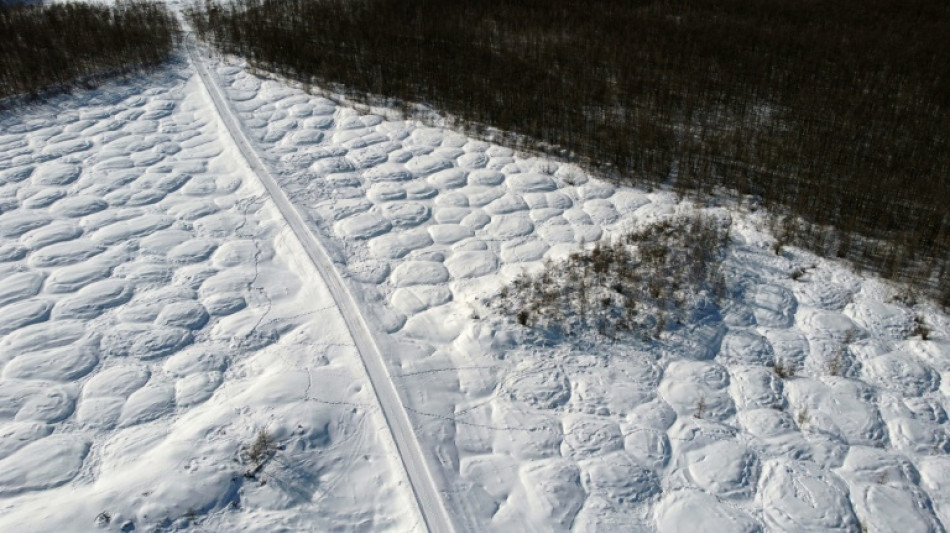
-
 India's Iyer says 'getting better by the day' after lacerated spleen
India's Iyer says 'getting better by the day' after lacerated spleen
-
Yesavage fairytale carries Blue Jays to World Series brink

-
 Bank of Japan keeps interest rates unchanged
Bank of Japan keeps interest rates unchanged
-
Impoverished Filipinos forge a life among the tombstones

-
 Jokic posts fourth straight triple-double as Nuggets rout Pelicans
Jokic posts fourth straight triple-double as Nuggets rout Pelicans
-
UN calls for end to Sudan siege after mass hospital killings

-
 Teenage Australian cricketer dies after being hit by ball
Teenage Australian cricketer dies after being hit by ball
-
As Russia advances on Kupiansk, Ukrainians fear second occupation

-
 Trade truce in balance as Trump meets 'tough negotiator' Xi
Trade truce in balance as Trump meets 'tough negotiator' Xi
-
China to send youngest astronaut, mice on space mission this week

-
 Yesavage gem carries Blue Jays to brink of World Series as Dodgers downed
Yesavage gem carries Blue Jays to brink of World Series as Dodgers downed
-
With inflation under control, ECB to hold rates steady again

-
 Asia stocks muted with all eyes on Trump-Xi meeting
Asia stocks muted with all eyes on Trump-Xi meeting
-
Personal tipping points: Four people share their climate journeys

-
 Moto3 rider Dettwiler 'no longer critical' after crash: family
Moto3 rider Dettwiler 'no longer critical' after crash: family
-
US economy in the dark as government shutdown cuts off crucial data

-
 Trump orders nuclear testing resumption ahead of Xi talks
Trump orders nuclear testing resumption ahead of Xi talks
-
'Utter madness': NZ farmers agree dairy sale to French group

-
 Samsung posts 32% profit rise on-year in third quarter
Samsung posts 32% profit rise on-year in third quarter
-
30 years after cliffhanger vote, Quebec separatists voice hope for independence

-
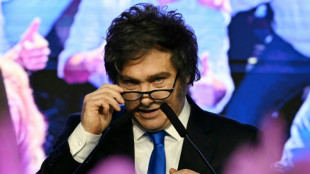 Taxes, labor laws, pensions: what Milei wants to do next
Taxes, labor laws, pensions: what Milei wants to do next
-
South Sudan's blind football team dreams of Paralympic glory

-
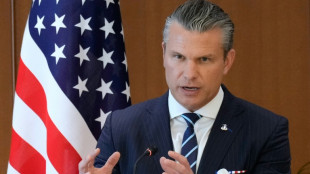 US says 4 killed in new strike on alleged Pacific drug boat
US says 4 killed in new strike on alleged Pacific drug boat
-
What we do and don't know about Rio's deadly police raid
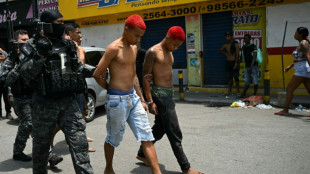
-
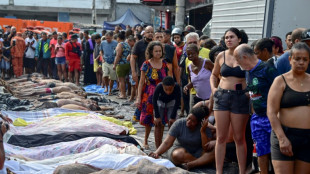 'They slit my son's throat' says mother of teen killed in Rio police raid
'They slit my son's throat' says mother of teen killed in Rio police raid
-
Arteta hails 'special' Dowman after 15-year-old makes historic Arsenal start

-
 Google parent Alphabet posts first $100 bn quarter as AI fuels growth
Google parent Alphabet posts first $100 bn quarter as AI fuels growth
-
Underwater 'human habitat' aims to allow researchers to make weeklong dives

-
 Maresca slams Delap for 'stupid' red card in Chelsea win at Wolves
Maresca slams Delap for 'stupid' red card in Chelsea win at Wolves
-
'Non-interventionist' Trump flexes muscles in Latin America

-
 Slot defends League Cup selection despite not meeting 'Liverpool standards'
Slot defends League Cup selection despite not meeting 'Liverpool standards'
-
'Poor' PSG retain Ligue 1 lead despite stalemate and Doue injury
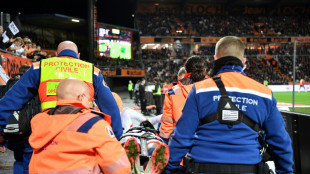
-
 Liverpool crisis mounts after League Cup exit against Palace
Liverpool crisis mounts after League Cup exit against Palace
-
Kane scores twice as Bayern set European wins record

-
 Radio Free Asia suspends operations after Trump cuts and shutdown
Radio Free Asia suspends operations after Trump cuts and shutdown
-
Meta shares sink as $16 bn US tax charge tanks profit

-
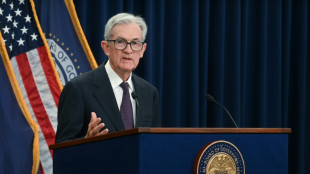 Dollar rises after Fed chair says December rate cut not a given
Dollar rises after Fed chair says December rate cut not a given
-
Google parent Alphabet posts first $100 bn quarter as AI drives growth

-
 Rob Jetten: ex-athlete setting the pace in Dutch politics
Rob Jetten: ex-athlete setting the pace in Dutch politics
-
Juve bounce back after Tudor sacking as Roma keep pace with leaders Napoli

-
 Favorite Sovereignty scratched from Breeders' Cup Classic after fever
Favorite Sovereignty scratched from Breeders' Cup Classic after fever
-
Doue injured as PSG held at Lorient in Ligue 1
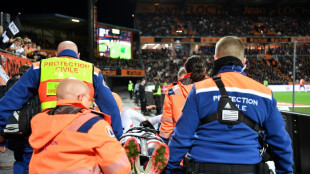
-
 Leverkusen win late in German Cup, Stuttgart progress
Leverkusen win late in German Cup, Stuttgart progress
-
Jihadist fuel blockade makes life a struggle in Mali's capital
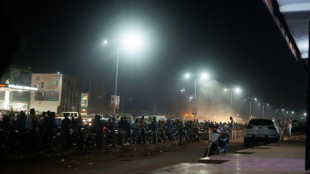
-
 Uber plans San Francisco robotaxis in Waymo challenge
Uber plans San Francisco robotaxis in Waymo challenge
-
Paramilitary chief vows united Sudan as his forces are accused of mass killings
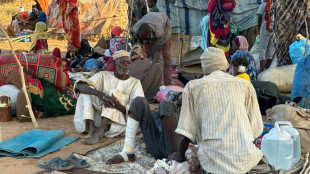
-
 Trump, Xi to meet seeking truce in damaging trade war
Trump, Xi to meet seeking truce in damaging trade war
-
Divided US Fed backs second quarter-point rate cut of 2025

-
 'Amazing' feeling for Rees-Zammit on Wales return after NFL adventure
'Amazing' feeling for Rees-Zammit on Wales return after NFL adventure
-
'Cruel' police raids help, not hinder, Rio's criminal gangs: expert
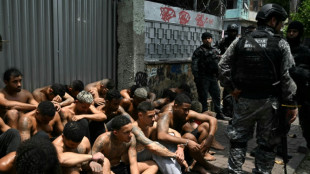

Thawing permafrost dots Siberia with rash of mounds
In the vast white expanse around Churapcha in eastern Siberia, the ever more rapid thaw of the permafrost is changing the landscape, cracking up houses and releasing greenhouse gases.
A growing number of little mounds are appearing across the region of Yakutia in the Russian Far East.
Known as "bylars" in the Yakut language, the tiny hillocks are no more than a metre high and have an almost regular polygonal shape.
"The peaks of these formations are stable. It is the space between the mounds that is sinking," said Nikita Tananayev, director of the climate laboratory at the Federal Northeastern University in the regional capital Yakutsk.
"With climate change, the ice is melting faster," he told AFP.
The mounds' distinctive shape is due to the fact that the underground ice that is melting is shaped in polygons.
Permafrost is a layer of soil that is never supposed to thaw and covers around 65 percent of Russia's territory.
- Record mild weather -
The distinctive mounds have even been appearing in urban areas in Yakutia.
In the town of Churapcha, around 135 kilometres from Yakutsk, the land Innokenty Poselsky bought last year to build a house has around 20 mounds.
"About 40 years ago, there was an airstrip here and the land used to be quite flat," the 34-year-old said.
"Over the last four decades, the landscape has become pockmarked. It's like that everywhere here," he said.
Poselsky said he has only managed to level around half of the land. His house is built on piles deeply embedded in the permafrost -- like all the buildings in the region.
The thaw is having a visible effect on residential and commercial property -- the walls of some buildings are subsiding and cracking.
"Over 40 percent" of buildings on permafrost are affected by thawing, Mikhail Kuznetsov, head of the federal agency for development of the Russian Far East, said last year.
Tananayev said rising temperatures were to blame.
Temperatures have gone up by "1.5 degrees Celsius in the last 30 years" in Yakutia and "up to two degrees in some areas", he added.
The numbers chime with data from global observatories using ice cores that show the last two years -- 2023 and 2024 -- were the hottest on Earth for more than 120,000 years.
Global warming is largely caused by fossil fuel consumption and Russia is the world's fifth biggest global emitter of greenhouse gases.
- Viruses and bacteria -
"A difference of one or two degrees Celsius, even if the temperatures are still negative, is very big in scientific terms because the permafrost does not freeze as deeply as usual," said Alexander Makarov, director of the Arctic and Antarctic Research Institute in Saint Petersburg.
The Institute is investigating the permafrost at 78 observation points in 12 regions of Russia and is hoping to increase the number to 140 points.
The thaw is also releasing more carbon dioxide and methane -- two greenhouse gases that were preserved in the ice for thousands of years.
That creates a vicious circle as the gases make climate change worse and in turn lead to more permafrost thaw.
Apart from effects on the climate, scientists warn that the thawing permafrost also has a health risk as it can release bacteria and viruses.
In 2016, a child died in Siberia because of anthrax -- which had not been seen in the region for 75 years.
Scientists believe it came from a reindeer that died of anthrax and was preserved in ice for decades.
Once released, the bacterium, which can stay in the ice for more than 100 years, had infected a reindeer herd.
D.Schaer--VB




